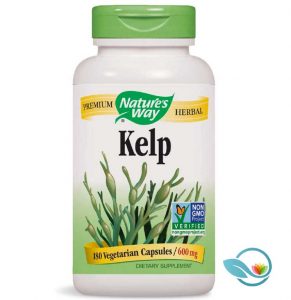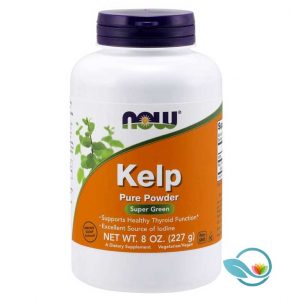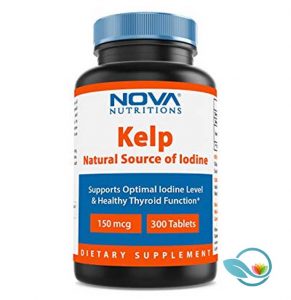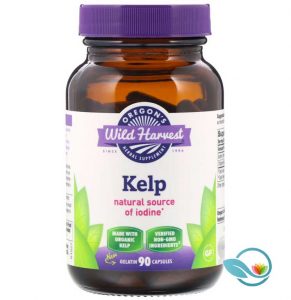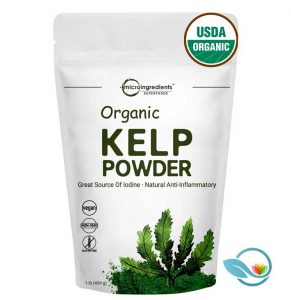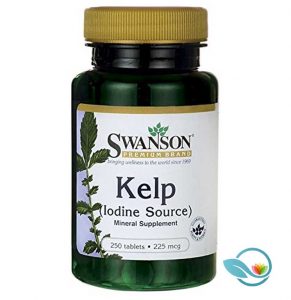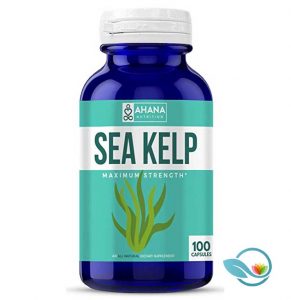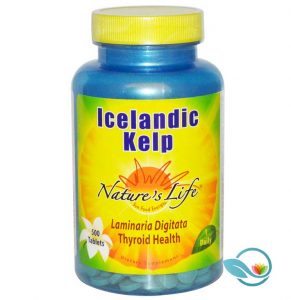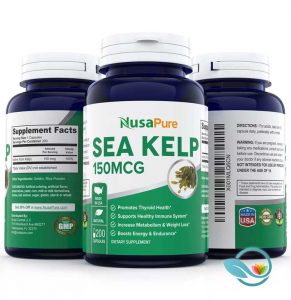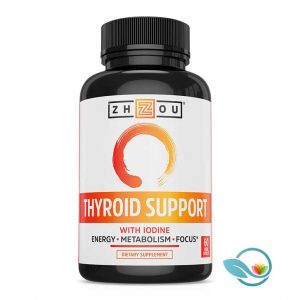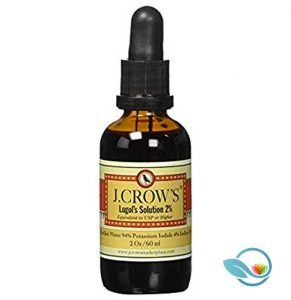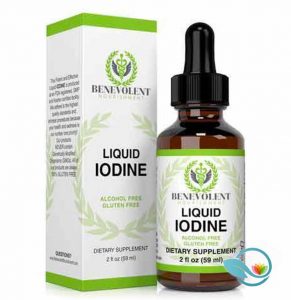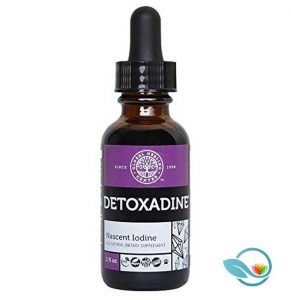Vitamins
Best Iodine Supplements of 2019
Published
6 years agoon

Iodine plays an essential role in thyroid function. Your thyroid, meanwhile, produces hormones that regulate weight, emotional balance, and cognitive function.
Today, many people are deficient in iodine. In fact, it’s estimated that more than two billion people are iodine deficient worldwide.
Iodine deficiency can lead to severe health problems, including imbalanced hormone levels and weight issues.
Getting too much iodine can also be problematic. Improper iodine levels can lead to hypothyroidism or hyperthyroidism.
To avoid iodine deficiency, many people now take iodine supplements. Iodine has strong bioavailability, which means it’s very easy to fix your deficiency.
Which iodine supplements are the best? Today, we’re ranking the top iodine supplements you can buy in 2019.
Rankings
Nature’s Way Kelp
Nature’s Way Kelp provides a strong dose of iodine derived from kelp. Kelp is an iodine-rich plant. With minimal processing, manufacturers like Nature’s Way can extract high levels of iodine from the plant. Each capsule of Nature’s Way Kelp includes 300 mcg of iodine per 600mg of kelp extract, which accounts for 180% of your recommended Daily Value (DV) of iodine.
The price is also very reasonable – like most other iodine supplements on this list. You’ll pay $7 for a package containing 180 capsules (180 servings). Nature’s Way is also a reputable and proven nutritional supplement manufacturer.
NOW Supplements Kelp
NOW Supplements Kelp contains 325mcg of iodine in each capsule, or 217% of your recommended Daily Value (DV). As with Nature’s Way iodine supplement at the top of our list, this formula is derived from natural kelp. NOW claims their supplement can support healthy thyroid function by providing an excellent source of iodine.
NOW makes some of the bestselling and most popular supplements sold through Amazon and other major retailers. They’re a large and well-known manufacturer. NOW’s kelp iodine supplement is also one of the best-value supplements on this list, offering 250 veggie capsules in each bottle, sold for around $8.50 on Amazon.
Nova Nutritions Kelp
Nova Nutrition’s kelp iodine supplement is priced as reasonably like the first two supplements on our list. you’ll pay $8 for a bottle containing 300 tablets, with each tablet containing 150mcg of iodine. That’s about half the dose of the two supplements above (which contain 300 to 325mcg). However, you also get a larger number of tablets.
The Nova Nutritions Kelp Supplement is sourced from kelp and packaged into a vegetarian capsule. Each capsule provides exactly 100% of your recommended Daily Value of iodine.
Oregon’s Wild Harvest Kelp
Oregon’s Wild Harvest is one of the pricier options on this list. Each bottle of Oregon’s Wild Harvest is priced at around $13 from Amazon, with each bottle containing 90 capsules. Each single capsule serving contains 400mcg of iodine, or 270% of your recommended daily value, sourced from 600mg of organic kelp.
There’s more iodine per capsule than any other supplement on this list so far. Oregon’s Wild Harvest also emphasizes their high-quality sourcing and processing: the company sources its kelp from the Atlantic Ocean off the coast of Nova Scotia, then freshly mills and prepares the formula for optimum potency. They claim their product is so fresh and natural that you can actually crack open the bottle and inhale it to smell the freshness.
Micro Ingredients Superfoods Organic Kelp Powder
Most iodine supplements on this list come in the form of tablets. Micro Ingredients, however, makes an Organic Kelp Powder supplement that offers a natural source of iodine. The formula is USDA Organic Certified and contains pure kelp powder. You can add a scoop to your shake or beverage of your choice. Some people like taking their iodine supplement this way, while others do not.
A foil package containing 90 servings (90 x 5g scoops) is priced at $19 from Amazon. Oddly, Micro Ingredients doesn’t disclose the exact dosage of kelp in each serving of the powder. However, the company claims the formula is rich in vitamins (vitamin A, B2, B12, and C) and minerals (zinc, iodine, magnesium, iron, and potassium), flavonoids, amino acids, fibers, polyphenols, fatty acids, and antioxidants. Other kelp powders contain as much as 270mcg of iodine (180% of your DV) in each 200mg scoop, although it seems unlikely the Micro Ingredients formula would contain this much organic kelp powder.
Swanson Premium Brand Kelp
Swanson Premium Brand Kelp offers 225mcg of iodine in each tablet. There are 250 tablets in each bottle, with a bottle sold for $13 from Amazon.
Swanson is one of the more reputable names in the supplement industry. The company has a long and proven history of selling good nutritional supplements. Their iodine supplement is sourced from Atlantic kelp that has been standardized to 0.4% iodine. Each tablet contains 150% of your recommended Daily Value of iodine.
Herbalia Natural Diet Supplements Organic Atlantic Kelp Powder
Herbalia Natural Diet Supplements makes a popular kelp/iodine powder sourced from Canada. The supplement claims to be 100% pure and natural while providing a strong daily dose of iodine. The kelp, like most other kelp on this list, is sourced from the Atlantic Ocean off the coast of Nova Scotia.
Each one-pound bag of kelp powder is available from Amazon for $14. Herbalia claims their formula can improve thyroid function, promote weight loss, support a healthy metabolism, and improve cholesterol levels while acting as a great source of iodine.
Ahana Nutrition Sea Kelp
Ahana Nutrition’s Sea Kelp has sourced from the coasts of Iceland and manufactured in the United States. Ahana claims to deliver “100% of the nutritional value” of kelp without using any chemicals, preservatives, or pesticides. Each one tablet serving contains 150mcg of iodine, which is exactly 100% of your recommended Daily Value.
Kelp is the only listed active ingredient. Ahana Nutrition claims their formula is rich in vitamins (A, B1, B2, C, D, and E) and minerals (magnesium, iron, zinc, iodine, potassium, and copper) that can have various health benefits, including better metabolism, better hair growth, improved blood sugar levels, weight loss, and more.
The main drawback of this supplement is the price. It’s much more expensive than other options on this list. Each bottle with 100 capsules (150mcg of iodine per capsule) is priced at $20 from Amazon. The three supplements at the top of our list deliver almost three times that value.
Nature’s Life Icelandic Kelp
Nature’s Life offers a surprisingly affordable kelp supplement sold on Amazon for $13 for 1000 tablets. Even better: each tablet contains 225mcg of iodine or about 150% of your recommended Daily Value. That makes it one of the best-value options on our list.
Nature’s Life claims their supplement can provide healthy thyroid support by delivering a strong dose of kelp. Nature’s Life is also one of the more longstanding producers in the supplement space: they’ve been making high-quality supplements since 1970.
NusaPure Sea Kelp
NusaPure Sea Kelp offers 150mcg of iodine in each tablet or 100% of your recommended DV. There are 200 capsules in a bottle, with each bottle sold on Amazon for around $13.
One of the drawbacks of this supplement is that it’s one of the few on this list to be packaged into a gelatin capsule instead of a vegetarian capsule. That means it’s technically not suitable for vegetarians and vegans. NusaPure claims their supplement can promote thyroid health, support a healthy immune system, increase metabolism and weight loss, and boost energy and endurance, among other potential health benefits.
Zhou Thyroid Support
Zhou is a popular nutritional supplement maker on Amazon that tends to do things a little differently than other suppliers. This is the only iodine supplement on our list that contains more ingredients than just kelp and iodine: Zhou has added a full spectrum of ingredients to support thyroid health in various ways.
Other ingredients in Zhou Thyroid Support include L-Tyrosine, ashwagandha root powder, Schisandra powder, bladderwrack powder, and cayenne pepper powder, among other ingredients. Each two capsule serving contains 150mcg of iodine along with high levels of vitamin B12, magnesium, zinc, selenium, copper, manganese, and molybdenum.
As you might expect, pricing is higher than other options here: you’ll pay $19 for a container with 30 servings (60 capsules, two capsules per serving). If you want full thyroid support, however, instead of just a high level of iodine, then this may be the right choice.
J. Crow’s Lugol’s Solution
This is another unique iodine formula. J. Crow’s Lugol’s Solution provides a high concentration of iodine a liquid tincture. The formula was originally created to sanitize water. Today, however, some people mix a few drops into water, a shake, or the beverage of their choice to enjoy the benefits of iodine.
Oddly, the only complaint about this supplement we can find is that the rubber stopper tends to wear out over time, making it difficult to access the iodine solution inside.
Benevolent Liquid Iodine
Benevolent’s Liquid Iodine formula contains 150mcg of iodine per drop. You place the drops underneath your tongue (sublingually) to instantly boost energy levels and reduce fatigue. There are 1300 servings of potassium iodide in each two-ounce bottle, with each bottle priced at around $18 from Amazon.
This is the first supplement on our list to use sublingual iodine drops instead of powders, tablets, or liquid solutions. If you want to maximize the absorption and get a strong dose of iodine from just a single drop per day, then Benevolent’s Liquid Iodine may be the right choice for you.
Global Healing Center Detoxadine Iodine
Global Healing Center sells a version of iodine in its natural atomic state. The company claims their iodine is the most easily absorbed and utilized a form of iodine available today.
While most other iodine supplements here use kelp, Global Healing Center Detoxadine Iodine sources its iodine from 300 million-year-old salt deposits located more than 7000 feet below the earth’s surface. Each drop contains 650mcg of iodine, which makes this the strongest iodine supplement on our list so far (that’s 400% of your recommended DV of iodine).
Our Rankings
Iodine supplements are surprisingly diverse. Sure, many of the iodine capsules and tablets are similar. But there are so many different ways to take iodine and so many different sources of iodine. To separate good and bad iodine supplements, our editorial team looked at the following ranking factors:
Iodine Dosage: The recommended Daily Value (DV) of iodine is 150mcg. Most supplements above contained between 150mcg and 600mcg of iodine. Getting the right dose of iodine is important: you can develop health problems by taking too much iodine. We made sure each iodine supplement had a dosage proven to be clinically effective.
Price and Value: Some of the iodine supplements listed above were priced unusually higher than competing supplements – despite offering identical dosages. We made sure each supplement was providing good value while still featuring a range of supplements at all different price levels.
Iodine Source: Some iodine supplements source their iodine from salt deposits deep within the earth. Most iodine supplement makers, however, use kelp sourced from the Atlantic Ocean. It’s unclear if one particular form of kelp is better than another at specific dosages. However, we featured a range of iodine supplements from multiple sources. Kelp may also provide additional benefits due to its antioxidants and other vitamins and minerals present.
Delivery Method: Iodine supplements above come in a variety of forms, including tablets, capsules, powders, and tinctures. We featured a range of iodine supplements for those who prefer different delivery methods.
Other Ingredients: Most iodine supplements above contained just iodine and kelp. Other supplements – like Zhou’s Thyroid Support supplement – contained a range of herbal extracts and other ingredients that could improve healthy thyroid function in other ways. Generally, we preferred pure iodine supplements.
Advertised Benefits: Some iodine supplements go overboard with their marketed health benefits. They claim you can cleanse toxins from your body, heal disease, and lose weight by taking an iodine supplement, for example. Others make minimal claims about their health benefits, simply stating that you can regulate thyroid function with an iodine supplement.
Manufacturer Reputation and History: We preferred supplement makers with a long and proven history of making high-quality supplements. Some of the supplement makers above have been making supplements since the 1970s, giving them a decades-long headstart over the competition. We didn’t favor supplement makers just because they were old, but we liked to see manufacturers with a long track record of success.
Based on all of the factors listed above, our editorial team pored over the top iodine supplements available today, then organized them into our rankings list.
Who Should Take an Iodine Supplement?
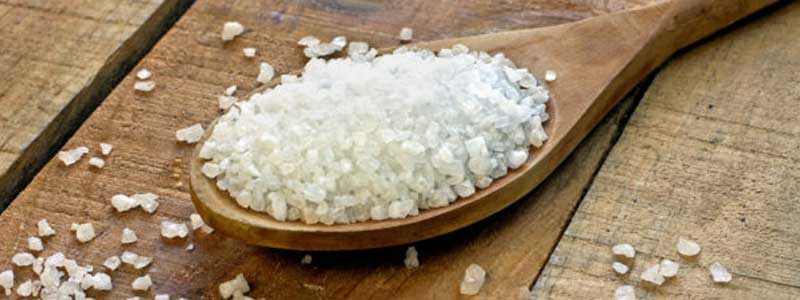
People take iodine supplements for a variety of reasons.
Nearly two billion people worldwide are iodine deficient. Iodine deficiency is rare in developed countries. However, people who fail to get enough salt in their diet, or those who deliberately avoid sodium, maybe iodine deficient without knowing it.
Other people take iodine supplements to maintain healthy thyroid function.
Some take iodine supplements to maintain cognitive function or support other health goals.
There are even some people who believe iodine can protect you against certain radiation. They claim iodine supplements can reduce the risk of cancer after a nuclear accident, for example. Surprisingly, there’s some research backing these benefits.
Iodine is an essential mineral, and it’s recommended that you get around 150mcg of iodine per day to maintain healthy thyroid function. Your thyroid produces the hormones responsible for controlling your weight and supporting other crucial body functions. Thyroid issues like hypothyroidism and hyperthyroidism can lead to severe health problems.
For all of these reasons and more, you may want to start taking a thyroid supplement.
Iodine Benefits
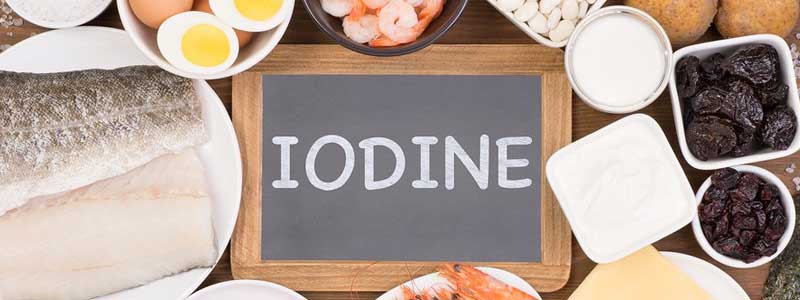
Is there really any reason to take an iodine supplement? Are there any specific health benefits associated with iodine? As a crucial mineral, iodine has been studied extensively over the years. Below, we’ll talk about some of the proven benefits of iodine and its effects on the human body.
First and most importantly, iodine plays a crucial role in keeping your thyroid functioning properly. Thyroid issues like hypothyroidism are directly connected to a lack of iodine. If you are deficient in iodine, your thyroid is unable to function properly.
Instead of citing each individual study on iodine deficiency, let’s look at someone who summed up existing research. Michael Zimmerman of the Swiss Federal Institute of Technology Zurich analyzed multiple studies on iodine and thyroid function. Zimmerman’s authoritative review showed that chronically low iodine intake was associated with poor thyroid function. This poor thyroid function led to an increased prevalence of cognitive disorders in infants and children. It also led to fatigue, weakness, and emotional instability in adults.
Zimmerman’s work, published in 2009, found that about two billion people worldwide have insufficient iodine intake. These problems were particularly prevalent in South Asia and sub-Saharan Africa. However, he also found that about 50% of Europeans were mildly iodine deficient.
Iodine deficiency has actually become more prevalent in developed parts of the world. Zimmerman’s research showed that adults in the United States and Australia have become more iodine deficient in recent years. Many people in developed countries have reduced their salt intake, and salt is the most common dietary source of iodine.
The effects of iodine deficiency in pregnant women and young children can be severe, reports Zimmerman:
“Iodine deficiency during pregnancy and infancy may impair growth and neurodevelopment of the offspring and increase infant mortality. Deficiency during childhood reduces somatic growth and cognitive and motor function.”
Zimmerman also cautioned that some people avoid taking iodine because they worry about getting too much iodine, which can also be hazardous for health. However, Zimmerman’s research suggested that “the relatively small risks of iodine excess are far outweighed by the substantial risks of iodine deficiency.”
Other studies have echoed the importance of getting enough iodine while pregnant. During pregnancy, the growing fetus needs iodine to maintain normal cognitive development. Many medical authorities recommend iodine supplementation for women who are pregnant or intend to become pregnant in the near future. Failure to get enough iodine can increase the risk of developmental problems in the child. It also raises the risk of infant mortality.
This study published in The Journal of Nutrition in 2003 found that iodine deficiency during pregnancy can lead to irreversible cognitive problems in the child. Interestingly, that study also showed that health problems can occur due to zinc, iron, and vitamin B12 deficiency. Zinc, iron, and vitamin B12 are all found in the kelp-based iodine supplements above, potentially making those supplements useful for women who are pregnant.
Of course, it’s possible to take too much iodine. One study from researchers in China found that taking too much iodine can lead to hypothyroidism and an increased risk of autoimmune problems affecting the thyroid. Researchers cautioned that women who are pregnant should be careful when taking high doses of iodine supplementation. Improper doses can lead to hypothyroidism.
Some of the iodine supplements above claim to protect you from cancer in the event of a nuclear accident. That may sound farfetched – but it appears to be partially true. In fact, many major cities, particularly cities near nuclear power plants, have stockpiles of iodine supplements specifically to protect populations after a nuclear accident.
Why is iodine connected to radiation? After a nuclear accident, radioactive iodine is released into the atmosphere. When this radioactive iodine enters the body, it’s rapidly absorbed by your thyroid, causing thyroid cancer.
This is the reason why iodine supplements were distributed throughout Poland following the Chernobyl disaster in the Soviet Union in 1986. Because the government distributed iodine supplements, they were able to prevent an increase in thyroid cancer in the years following the disaster. We know these iodine supplements worked because other countries nearby did distribute iodine supplements and did see an increase in thyroid cancer.
Most people in the developed world are not iodine deficient. Most people get sufficient levels of iodine from salt. However, salt consumption has declined in recent years, and iodine deficiency has started to increase.
Researchers have found that women are particularly vulnerable to iodine deficiency as a result of dietary salt restriction. However, both men and women may fail to get enough iodine in their diet as a result of salt restriction. Researchers have also found that iodine supplements are an ideal way to get the benefits of salt without the downsides – like a higher risk of heart disease and high blood pressure. That’s why it’s recommended anyone following a low-salt diet to consider taking an iodine supplement.
Overall, iodine plays a crucial role in multiple body functions. Repeated research has shown that iodine affects cognitive ability, thyroid function, hormone production, and multiple other aspects of health and wellness. Iodine is particularly important for women who are nursing or pregnant, and iodine deficiency in pregnant or nursing women can cause health problems in the fetus or child.
Side Effects of Iodine

Iodine is a crucial mineral required by the body. When taken at the recommended dose, iodine seems to be safe and healthy for most people
However, the side effects of iodine can be quite serious. Just like iodine deficiency can lead to health problems, an excess of iodine can lead to its own health problems.
Very high doses of iodine in pregnant women, for example, have been associated with an increased risk of hypothyroidism during pregnancy. Hypothyroidism can cause health problems for both the mother and the infant.
Other health problems, like goiter, may also be experienced by those with high iodine intake levels.
Generally, if you keep your dose of iodine reasonable, you’re unlikely to experience severe iodine side effects. Most health authorities, including the National Institutes of Health, have established an upper intake limit of 1100mcg of iodine per day for both men and women. Exceeding this limit can increase your risk of thyroid problems.
Keep in mind that 1100mcg of iodine per day is your total limit per day. If you’re already consuming a lot of salty foods or iodine-rich foods, then take an iodine supplement on top of that, then you may inadvertently approach this limit.
Recommended Dose of Iodine
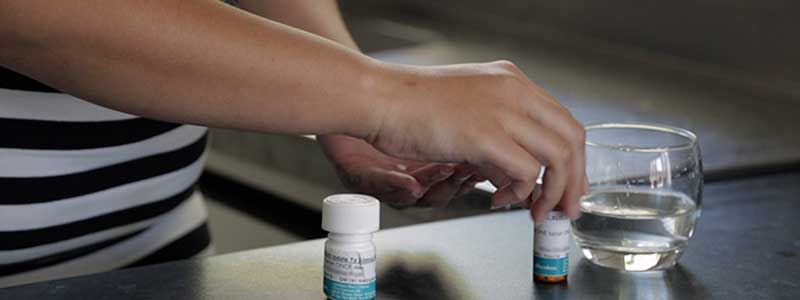
The recommended dose of iodine varies by age. However, it does not vary by gender:
- Birth to 6 Months: 110mcg per day
- 7 to 12 Months: 130mcg per day
- 1 to 3 Years: 90mcg per day
- 4 to 8 Years: 90mcg per day
- 9 to 13 Years: 120mcg per day
- 14 to 18 Years: 150mcg per day
- 19+ Years: 150mcg per day
- Pregnant Women: 220mcg per day
- Nursing Women: 290mcg per day
Certain health authorities, including WHO, recommend a higher dose of iodine for pregnant women, raising the recommended daily allowance (RDA) to 250mcg per day.
Most health authorities also set an upper limit of 1100mcg of iodine per day. They do not recommend exceeding this amount of iodine.
FAQs About Iodine
Q: What is iodine?
A: Iodine is a trace element naturally present in some foods. It’s also added to other foods (like enriched salt or bread) and available as a dietary supplement.
Q: What does iodine do?
A: Iodine is an essential component of the thyroid hormones thyroxine (T4) and triiodothyronine (T3). These hormones regulate crucial body functions, including your metabolic ability and weight changes. Thyroid hormones are also particularly important for proper development of the skeletal and central nervous system in fetuses and infants.
Q: Which foods contain the most iodine? Is it possible to get enough iodine from an ordinary diet?
A: Most people are not iodine deficient. Most people get enough iodine from a healthy, balanced diet. Foods that are particularly rich in iodine include seaweed, cod, yogurt, iodized salt, milk, fish sticks, white and enriched bread, fruit cocktails, shrimp, ice cream, macaroni, eggs, tuna, corn, prunes, and cheddar cheese. Most of us get our daily intake of iodine from enriched salt.
Q: Do pregnant and nursing women need more iodine?
A: The recommended daily intake of iodine for pregnant and nursing women is higher than the general population. Adult males and females are told to get 150mcg of iodine per day, for example. Pregnant women are recommended to get 220mcg of iodine per day, while nursing women are recommended to get 290mcg of iodine per day.
Q: Why are certain countries iodine deficient while other countries are not?
A: Researchers have found that certain parts of the world are more iodine deficient than others. Populations in South Asia and sub-Saharan Africa, for example, are the most iodine-deficient people in the world. Many of these people live in areas with iodine-deficient soils. Iodine-deficient soils produce crops with low iodine levels. Mountains areas like the Himalayas, Alps, and the Andes, for example, are traditionally iodine-deficient, as are river valleys prone to flooding – including many of the river valleys in South and Southeast Asia.
Q: Is iodine deficiency common in the developed world?
A: Approximately 35% of the world’s population, or 2 billion people worldwide, are iodine deficient. Most of these iodine deficient people live in developing parts of the world, including sub-Saharan Africa and South Asia. However, iodine deficiency is becoming more common in the developed world because of the popularity of low-salt diets.
Q: Is iodine deficiency common in the United States?
A: Iodine deficiency was once a huge problem in the United States, including in regions with naturally low levels of iodine in the soil. This was a big problem in the mountainous regions of America, for example, along with the so-called “goiter belt” around the Great Lakes. As the country has developed, however, iodine deficiency is relatively uncommon.
Q: Is iodine deficiency common in Europe?
A: Iodine deficiency is more common in the less developed parts of Europe. A recent WHO report indicated that 52% of people in Europe (outside of the western Europe subregion) had insufficient iodine intake.
Q: Should I take an iodine supplement while pregnant?
A: Talk to your doctor to determine if you should take an iodine supplement while pregnant. You may already be getting enough iodine. Many pregnant women, however, are deficient in iodine, and this iodine deficiency can lead to irreversible cognitive issues on the developing fetus.
Q: Where do iodine supplements come from?
A: Iodine supplements typically source their iodine from one of two sources. Some get their iodine from salt deposits deep underground. Most supplements above, however, get their iodine from kelp, particularly kelp grown in the Atlantic Ocean off the coast of Canada or Iceland.
Q: Are iodine supplements expensive?
A: Iodine supplements are generally affordable. Many of the top iodine supplements above are priced at under $10 for a 3 to 4 month supply, for example.
Q: Do I need to take an iodine supplement?
A: We recommend talking to your doctor before taking an iodine supplement. Generally, most people do not need to take an iodine supplement if they have a healthy, balanced diet. However, women who are nursing or pregnant may need to take an iodine supplement, or those who are following a low-salt diet may wish to take an iodine supplement.
Final Word
Iodine is a crucial mineral required to synthesis thyroid hormones. Thyroid hormones play an important role in the human body. In pregnant and nursing women, thyroid hormones affect the development of the body’s skeletal and central nervous systems. In adults, thyroid hormones control metabolic activity and weight gain, among other crucial functions.
Iodine deficiency is relatively rare in the developed world. However, it’s becoming more common as salt intake has decreased over the years. Today, some people take a thyroid supplement to maintain healthy thyroid function.
It’s recommended that adults get 150mcg of iodine per day. It’s also recommended that you get less than 1100mcg of iodine per day overall (food and supplement sources combined). By staying within the recommended range, you may be able to support good thyroid health with an iodine supplement.


